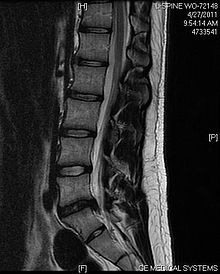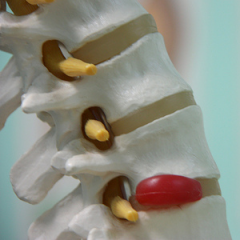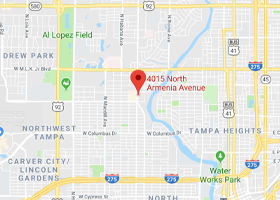A spinal disc herniation (protrusion, prolapse or slipped disc) is a condition affecting the spine in which a tear in the outer, fibrous ring of the disc allows the soft, central portion to bulge out beyond the damaged outer rings. A tear in the disc ring may result in the release of inflammatory chemical mediators which may directly cause severe pain the displaced material may cause nerve root compression with resultion arm or leg pain, numbness or weakness.
 Treatment of herniated discs has three goals. Reduce radiating arm or leg pain, reduce low back pain and restoring mobility, strength and function. Multiple forms of treatment are utilized to achieve these goals.
Treatment of herniated discs has three goals. Reduce radiating arm or leg pain, reduce low back pain and restoring mobility, strength and function. Multiple forms of treatment are utilized to achieve these goals.
The first is to reduce inflammation. Topical ice and non steroidal anti inflammatory medications may be recommended.
The second goal is mobilization and flexion distraction and/or spinal manipulation may be used. Discs have a poor blood supply. Achieving healing requires mobilization to pump away inflammatory chemicals and swelling and to bring in new nutrients.
Mobilizing the disc and reducing inflammation may reduce the chemical and mechanical irritation of the nearby spinal nerve root and reduce radiating arm or leg pain.
 Restoring function and strength will likely involve rehabilitative exercise on a physioball, range of motion exercises or home exercise.
Restoring function and strength will likely involve rehabilitative exercise on a physioball, range of motion exercises or home exercise.
Treatment times may very depending on the degree of disc injury and may be as short as a few weeks or may last as long as a few months.
Combinations of spinal manipulation and exercise are now not only accepted forms of treatment, but are becoming the recommended form of treatment. One hospital requires such a trial before surgical intervention will be considered.
A recent study on the effectiveness of chiropractic care for sciatica showed that chiropractic spinal manipulations were equally as effective as surgery (microdiskectomy) in treating sciatica. The study in “Journal of Manipulative and Physiological Therapeutics” reported “sixty percent of patients with sciatica who had failed other medical management benefited from spinal manipulation to the same degree as if they underwent surgical intervention.” – Article by Brad Woodle
Should a trial of conservative care fail to offer improvement, or in the case of progressive neurologic defecit (worsening numbness or weakness), we routinely refer for neurosurgical consultation.
